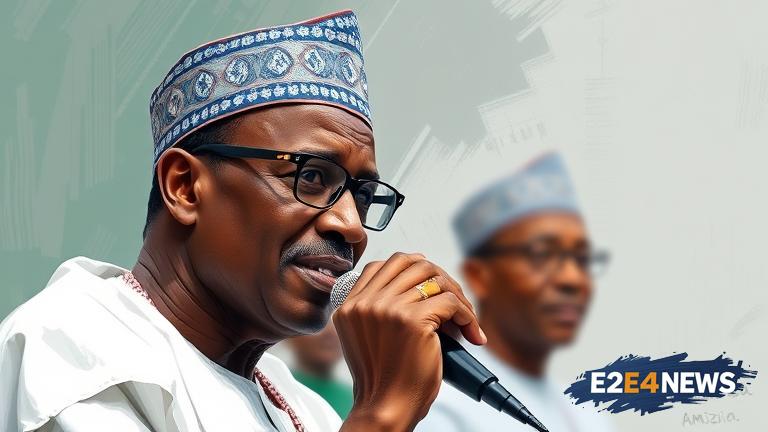The recent revelation by Garba Shehu, a spokesperson for President Muhammadu Buhari, has shed light on the underlying reasons behind Buhari’s decision not to intervene in Bola Tinubu’s presidential bid. According to Shehu, Buhari’s non-interference was a deliberate choice, driven by his commitment to upholding democratic principles and respecting the will of the people. Shehu emphasized that Buhari’s primary concern was to ensure a free and fair election, allowing the Nigerian people to decide their leader. This stance is a testament to Buhari’s dedication to strengthening Nigeria’s democratic institutions and promoting a culture of accountability. The decision not to stop Tinubu was also influenced by Buhari’s desire to avoid being seen as interfering in the electoral process, which could have undermined the legitimacy of the outcome. Furthermore, Shehu highlighted that Buhari’s relationship with Tinubu is built on mutual respect and trust, which played a significant role in his decision-making process. It is essential to note that Buhari’s approach to governance has always been guided by a strong sense of responsibility and a commitment to doing what is right for the country. The fact that Tinubu emerged as the presidential candidate of the All Progressives Congress (APC) is a reflection of the party’s internal democratic processes. Shehu’s revelation has sparked intense debate and discussion among Nigerians, with some praising Buhari’s decision as a demonstration of his commitment to democracy, while others have raised concerns about the potential implications of his non-interference. As the country continues to navigate its complex political landscape, it is crucial to recognize the importance of respecting the democratic process and allowing the will of the people to prevail. The role of leadership in shaping the country’s future cannot be overstated, and Buhari’s decision serves as a reminder of the need for leaders to prioritize the greater good. In the context of Nigerian politics, the relationship between Buhari and Tinubu is significant, and their mutual respect and trust have contributed to the stability of the political landscape. The fact that Buhari chose not to intervene in Tinubu’s presidential bid demonstrates his confidence in the democratic system and his willingness to allow the people to decide their leader. This decision has far-reaching implications for the country, as it sets a precedent for future elections and reinforces the importance of respecting the will of the people. As Nigeria continues to evolve and grow, it is essential to prioritize democratic principles and ensure that the electoral process is free from interference. The country’s future depends on the ability of its leaders to put the interests of the nation above personal ambitions, and Buhari’s decision serves as a positive example of this commitment. In conclusion, Garba Shehu’s revelation provides valuable insight into the reasoning behind Buhari’s decision not to stop Tinubu from becoming President. The decision reflects Buhari’s dedication to democracy, his respect for the will of the people, and his commitment to upholding the principles of good governance. As Nigeria moves forward, it is crucial to recognize the importance of leadership in shaping the country’s future and to prioritize the values of democracy, accountability, and transparency. The country’s progress depends on the ability of its leaders to work together in the best interests of the nation, and Buhari’s decision serves as a positive step in this direction. With the 2023 presidential election having come and gone, it is essential to reflect on the lessons learned and to recognize the significance of Buhari’s decision in the context of Nigerian politics. The fact that Tinubu emerged as the winner of the election is a testament to the democratic process and the will of the people. As the country looks to the future, it is crucial to prioritize the values of democracy, accountability, and transparency, and to recognize the importance of leadership in shaping the nation’s destiny. In the end, Buhari’s decision not to stop Tinubu from becoming President will be remembered as a significant moment in Nigerian history, one that reflects the country’s commitment to democracy and the rule of law. The decision has set a precedent for future elections and has reinforced the importance of respecting the will of the people. As Nigeria continues to grow and evolve, it is essential to prioritize the values of democracy, accountability, and transparency, and to recognize the significance of leadership in shaping the country’s future.
